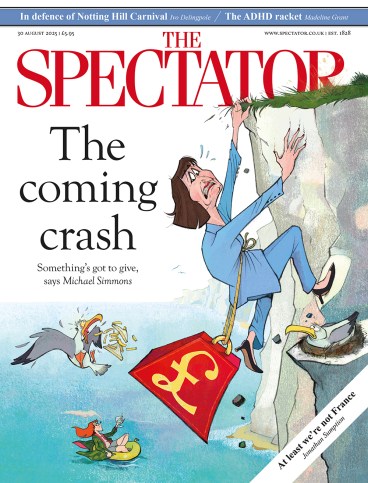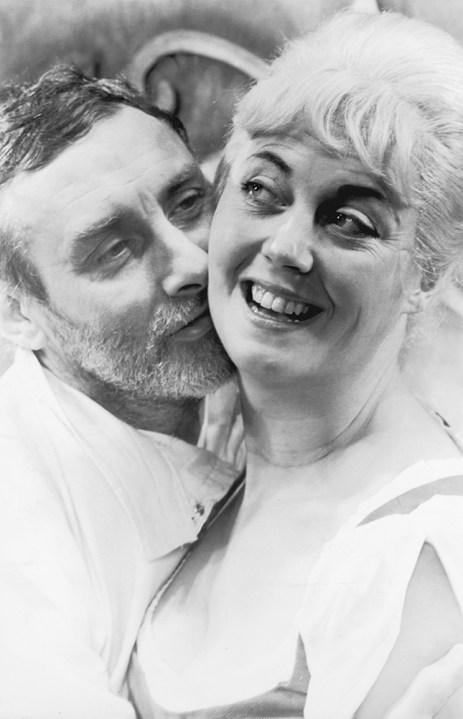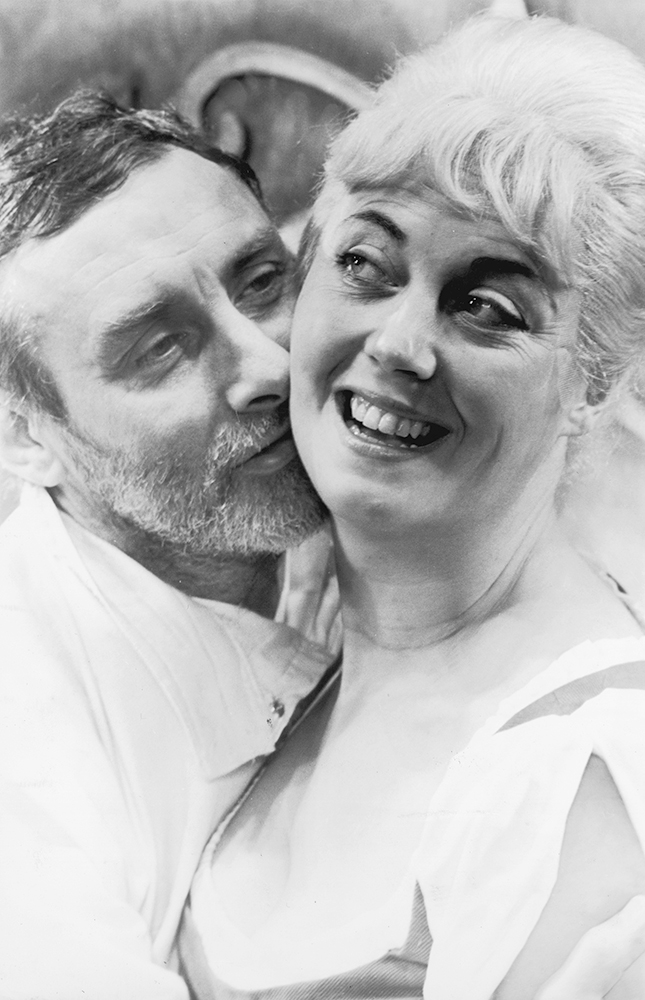
The theatre impresario Michael White rang me one day in 1964, and said he was presenting a play at the Lyric Hammersmith, where there was a small role he thought might suit me. The play was an adaptation of the novel Oblomov by Ivan Goncharov, where the eponymous hero spends most of his life in bed, unable to see the point of engaging with the world outside. It was being put on as a vehicle for Spike Milligan, who was said to be jealous of the success of his longtime partner in The Goon Show, Peter Sellers. Sellers had recently made a seamless transition from the world of anarchic comedy to film, where he proved himself to be an accomplished ‘straight’ actor. Milligan and his management hoped he could make a similar transition, and this play was thought to be a perfect showcase for him.
Every evening at the theatre I was subjected to a couple of hours of ritual humiliation
The director, Frank Dunlop – a delightful man, who looked like an amiable walrus – auditioned me for the part of Alexeyev, the shy aesthetic friend of Oblomov. The role would mean a couple of scenes with Milligan, and I was thrilled when I got it.
Playing opposite Milligan was the feline beauty Joan Greenwood, whose voice – a low gurgling contralto – once heard was never forgotten. Bill Owen, who was cast as Zakhar – Oblomov’s long-suffering servant – was a very talented comic actor, who had not so long before had great success as Macheath in the Weill/Brecht Threepenny Opera. Frank had cast all the supporting roles with excellent actors, and we began rehearsals at the Lyric, with hopes high.
The rehearsals progressed quite well. Milligan was clearly finding his feet as a legitimate actor, but he entered into the process in good faith, and kept the cast amused with his comic riffs when we had breaks.
As the opening night approached, after endless run-throughs and rewrites, Milligan was given extra comic business to liven things up, but when the play finally opened to the public it was still a faithful, if mildly creaking, adaptation of the Goncharov novel.
On the opening night the first act limped along to no great effect. The audience was unresponsive, and possibly perplexed. Milligan had trouble with his lines, knocked over a couple of props, and was not proving himself to be a potential rival to Peter Sellers.
In the interval Milligan’s agent came up to the dressing-room I was sharing with two other lads. He was nervous, pacing round the room, endlessly asking each one of us: ‘How do you think it’s going?’ ‘Well, I don’t know really – it’s going’ was the general response. He was too nervous to go out front and watch the second act, so he decided to stay in our room and listen to the rest of the play on the tannoy.
The second act was called and the curtain went up. The beginning of the act took place in a park on a summer’s day, a brass band playing in the background. Oblomov, now risen from his bed, was out with his girlfriend, enjoying the fresh air, embarking on a tender relationship, a love that had motivated him to see the reason for living in the world.
Over the tannoy we heard Milligan addressing the audience: ‘Since you’re not all in your seats I think Joan and I will go for a little walk. Come on, Joan – let’s go!’
There was now a roar of laughter from the audience. Their favourite comedian was finally delivering what they wanted – his unexpected and anarchic ad libs.
The agent in the dressing-room turned white, and possibly green when he heard the next statement from the stage.
‘I don’t think this is going too well,’ Milligan said to the now hysterical public. ‘I hope Milton Shulman is here. He usually likes me.’ Shulman was the critic of the London Evening Standard. He had a deserved reputation for being a harsh, but humorous theatre critic.
‘Milt, are you there?’
‘Yes, I’m here,’ Shulman shouted back at the stage.
‘Milton, take a bow. Ladies and gentlemen, I give you Milton Shulman.’
Gamely, Shulman stood up to deafening applause. Somehow, after this riotous episode died down, the play resumed and limped again to its final curtain.
At the party after, people just didn’t know what to say. The cast went home, recognising sadly that, after all the hard work and dedication, they were in a turkey.
The next day we were called to rehearsal. Frank, Michael, and possibly Milligan himself had decided the show could be salvaged. As Milligan had broken down the fourth wall of the theatre by stepping out of character, a remedy was being suggested for saving the show.
Milligan would now add business, talk to the audience, do his brilliant extemporising. We, the rest of the cast, would play our roles absolutely as written but the show would evolve into an original event, where the actual nature of the play, and the performance of it, was being mocked by the man in the central role as if, in a nightmare, a comedian found himself in a straight play and didn’t know how to proceed, except to win over audiences to his side, conspiratorially inviting them to see the ridiculousness of theatre.
Each performance was now completely different from the previous ones. Milligan had been given his head, and audiences began to flow in. A few weeks later various critics, including Kenneth Tynan, came to see it a second time, and hailed it in the press as an extraordinary piece of theatre, the ‘funniest show in town’.
When the five-week run ended at the Lyric, it transferred to the Comedy Theatre in the West End, where, after more rehearsals, it was retitled Son of Oblomov.
Some of the actors were replaced, and some bailed out, unable to carry on in what seemed like total confusion and mayhem. Tristram Jellinek, a fine actor playing a romantic hero, was not best pleased when he came on for his first scene with Oblomov, to hear Milligan whisper to the audience: ‘Here he is, folks, Isolde Jellinek.’
More comic business was meticulously rehearsed into the show, and we were often asked after a performance whether we were taken by surprise by something Spike did. Of course we often were but also we sometimes were not, because it had been planned, and we had endlessly perfected looking nonplussed at some of the wildest interpolations.
When the show went to the West End, it was a sell-out hit, the hottest ticket in town. For a young actor, to be in a success like this was heady stuff, and the first months of the run were a lot of fun. Not just because the show was different every night, and you were kept on your toes, but because everyone came. I met new people, I went out most nights after the show to actors’ haunts, and became part of the West End acting community.
I was also pleased, because at the Lyric my performance had been generously praised by a few critics, and so I had been given a new scene with Bill Owen, where we fed ducks and I imitated their quacking. This little turn went down well, and I think Michael White especially was delighted that his flâneur friend (we’d met at Les Deux Magots in Paris) had pulled something off.
The Queen, who rarely went to the theatre, came for her birthday, with Prince Philip, Prince Charles, Princess Margaret, Lord Snowdon, Peter Sellers and his then wife Britt Ekland. To please the royal party, Milligan and Sellers, standing up in the stalls, performed a Goon Show sketch in the middle of the show. None of the cast knew this was going to happen, but that’s the way it was, and we conscientiously carried on as if we were performing in a great classic, pretending not to notice the madness in our midst.
A few minutes later, there was banging on my door, Milligan shouting ‘I’m going to kill you’
Spike seemed to like me, and often invited me to go to Ronnie Scott’s club in Soho after the show. Fuelled by alcohol, I would tell him my problems, about my fight with depression, and my visits to the analyst. He never showed much empathy, or said anything about his own condition, for everyone knew he was manic-depressive. Next to the bed where he spent most of the first act he often sipped a beverage that was definitely not water, and sometimes even popped a pill during my scene with him. I was young, flattered by his friendship and, like most young people, not shy about talking into the night about myself.
In my first scene with him, I would tiptoe on to the stage and then wake up the sleeping Oblomov. At one performance, as I made my entrance, he sat up in bed and addressed the audience: ‘Here he comes – he’s not well. He goes to a psychiatrist four times a week.’ (Then, in a whispered aside) ‘I think he’s mad.’
Another time as I came on: ‘Watch this actor – he’s the worst actor in England.’
Joan Greenwood was outraged that I had been insulted in this way, and I can’t say I was thrilled, but I accepted that the show’s success was dependent on this humiliation of the actors by the comedian, and resignedly carried on.
The night I came on for my rather quiet, intimate scene with him, and found a drunk from the audience sitting in my chair on the stage, was more challenging, but as everyone in the cast thought it very funny, I didn’t think I was in any position to complain. Spike had invited the man on to the stage. He was wearing a football scarf and shaking a rattle, and kept shouting ‘Ipswich’. So stoically I carried on regardless.
One of Spike’s favourite bits of business was to interrupt my dialogue, go to the front of the stage and take a chocolate from a member of the audience in the front row. This brought the house down. Clearly audiences loved seeing how this disruption threw the other actor, me in this case. One night he did it with the usual response, and as he settled back into the scene I slowly got up and went to the front of the stage, helping myself to another chocolate. An even bigger roar of laughter. He never did it again.
Another time in the middle of our scene he said, ‘Sorry, I’ve got to have a pee,’ jumped off the front of the stage, and ran through the stalls to the lavatory at the back of the auditorium. Left alone, I began to improvise a soliloquy along the lines of ‘It’s been snowing here – the lake is frozen, etc.’ but realising that this was going nowhere I stood up, the quiet and gentle Alexeyev, and in a loud voice sang: ‘Swanee, how I love you, my dear old Swanee, I’d give the world to be right in the heart of Dixie.’ I was greeted with an ovation, but told later by the company manager that I had overstepped the mark.
A nice interlude in the run was the arrival of the Actors’ Studio company. They were rehearsing Three Sisters in our theatre, and since I had friends in the company from my time in New York, I was allowed to attend the rehearsals. It was by no means a successful production, but spending the day watching some of the greats of the American theatre – George C. Scott, Kim Stanley and Luther Adler – was a welcome respite for me, before going to the theatre in the evening for a couple of hours of ritual humiliation.
I began to get bad colds, flu, and other little maladies, doubtless psychosomatic, and would often call the theatre in the morning to say I was not well enough to perform and that my understudy should go on.
Quite late in the run, at a matinee, I came on to do my scene with Milligan. Clearly he wasn’t well, or had popped one too many of those pills. We would do a page or two of our scene, then he would start rambling about the war in Vietnam, the killing of young children, then he would go back to the text. But every time he would repeat the same dialogue we had already delivered. When he began speaking the same dialogue for the third time, I attempted to move things on, by saying before my line: ‘As I said a moment ago.’ Before I completed the speech he sat up in bed and said, ‘This actor is a complete egotist. I have no more to say’, and pulled the bedcovers over his head.
I then improvised a few lines to cover the embarrassment, and Bill Owen, followed by Valentine Dyall, came on to save me, before I made my exit.
At the interval the company manager rushed to my dressing-room. ‘Stay in your room and lock your door. Spike has gone nuts.’ I nervously followed his instructions.
In the middle of our scene he said, ‘Sorry, I’ve got to have a pee,’ and jumped off the front of the stage
A few minutes later, there was banging on the door, Milligan shouting ‘I’m going to fucking kill you’ – but I didn’t respond and he went back to his room. Going on for my second scene with him, I was paralysed with nerves, but he had turned into a zombie, murmuring the text and not looking at me. In the evening performance it was the same. I went home shaken, wondering whether I would be fired for upsetting the star, and feeling very guilty I had offended him.
I thought of writing him a note to apologise. I knew too well by now he was manic-depressive, and I knew also how easy it is to trigger a manic episode in someone so disturbed.
The next morning I received a call from the company manager saying Spike was ill, and would not be performing that evening. The cast was called to rehearse with his understudy.
At the theatre there was a discussion about who should go on. His understudy John Collins was well prepared to do it, but it was decided that Bill Owen should play Spike’s part that night.
Owen interpolated his own jokes – not particularly appropriate – and it was decided after one performance he should not do another. At the next performance Valentine Dyall offered his services, and he went on, with his somnolent bass voice and a personality which suggested something of the night. The response from the audience was understandably muted. At the third performance John Collins finally went on, did a very good imitation of Milligan, and kept the show afloat. It must be a record in the history of West End theatre that the leading role in a show was played by four different artists in the space of a week.
Meanwhile on the front page of the Daily Mail there was a headline about Milligan’s mystery illness. Michael White questioned me about what I had done to him. I tried to explain as best I could. The cast stood by me, and there was a general sigh of relief when Milligan returned before the end of the week.
After he came back, everything seemed to resume as earlier. He played the scene with me quite generously, and after a week or so invited me to go out with him to Ronnie Scott’s again. I went and didn’t talk about myself for a change. I was pleased by the outcome, but wary, and not so long afterwards told the management I wanted to give my notice. I had already been in the show for almost a year, and that was enough.
The cast gave me go-away gifts, and Milligan gave me a book, with a nice if rather bland: ‘Thank You and Goodbye.’
An extract from Peter Eyre’s unpublished memoir Getting Through.








Comments